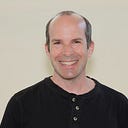Your Expertise Is Killing Your Creativity
Being an expert in your field limits your unconventional thinking.
Remember when you didn’t know anything and had all these great ideas? Then you started learning something new and got really inventive, right? Ideas flowed like a river as you learned more and more. People called you an “out of the box” thinker. Then you became an expert in your field, great at executing tasks, and the ideas stopped. What happened?
Creativity keynote speaker and former Disney executive Duncan Wardle may have the answer — and a solution — to the desertion of your ideas. In his TED talk, the “Theory of Creativity,” Wardle explains how becoming an expert can hinder your creativity.
What’s wrong with expertise?
Wardle argues one of the biggest barriers to your creativity is your own expertise. When you become an expert, your knowledge in a particular subject becomes deep and wide (called “lateral thinking” by Edward de Bono). You know everything that is supposed to happen in your field. This is why you have trouble thinking outside your box. You know too much.
Wardle used a thought experiment with architects to demonstrate lateral thinking. When most architects were asked to do a quick sketch of a house, what did they do? They drew a square with a triangle on top, added a rectangular door to the front and some rectangular windows, and maybe a chimney coming out of the roof. But there was also a non-architect in the room—a Chinese chef. He created a house that looked like food.
Experts do the expected thing based on their expertise. Non-experts try different ideas because they are not limited by your field’s conventions. This is why Wardle thinks Google and Apple had an advantage in developing the next big innovation in automobile transportation — they are not limited by their expectations like automobile engineers at Ford, Toyota, or BMW.
How to increase your creative ideas?
Wardle suggested three ways you can overcome the limitations of your expertise: be playful, talk to naive experts, and reframe the challenge.
1)Be playful.
When looking for new ideas be playful. A massive obstacle to getting creative ideas at work is being at work. When Wardle asked over 5,000 people where they got their best ideas. They never mentioned work.
People at work are in what Wardle calls the “Busy Beta” brain state. At work, you are focused on tasks and not relaxed enough to access your subconscious to be creative.
To get more ideas, you need to stop work and do something else. Our best ideas come when we are relaxed and not concentrating: when we are in the shower, on a walk, exercising, meditating, etc.
2) Talk to a naive expert.
Want to find an unexpected approach to your problem? Talk to someone who isn’t an expert in your field. Naive experts are smart people who aren’t trained in your area of expertise. They are not limited by what is expected.
Naive experts may not solve your problem, but they will not be afraid to ask the “stupid” question or make an audacious suggestion. These questions and ideas can stimulate you to think of new ways to approach a problem.
This is partly why the Pixar headquarters was designed with bathrooms in the middle, so people from different fields could meet and exchange ideas. Some of the best solutions for your field might come from talking to someone outside your field.
3) Reframe the challenge.
Sometimes all you need to do to stimulate an idea is to reframe the challenge. When Walt Disney released Fantasia in theaters, he had a big plan to make it great. He wanted to make the ceiling drip during the rain sequence and to pump in heat during a warm sequence. But the owners of the movie theaters wouldn’t allow him to change the theater environment. So he had to reframe the challenge of creating an experience for his audience.
Disney created a three-step way to reframe the challenge:
1) What are the rules?
2) What if?
3) Imagine if…
Disney used this process for Fantasia. The rules were the theater controlled the environment for experiencing Disney creations. Disney then asked, “What if Disney controlled the environment?” This idea led to the imagining-a-solution stage: “Imagine if there was a place where people could experience a live Disney experience.”
This answer turned into the Disneyland theme park. By reframing the challenge, he came up with a creative solution and possibly his most impactful idea ever
The next time you find creative ideas deserting you, try one or more of these methods to bring them back. Get out of work, be playful, invite a naive expert to hear your ideas, or reframe the challenge.
Kyle Crocco weekdays as the Content Marketing Coordinator at BigSpeak Speakers Bureau and weekends as the lead singer of Duh Professors. He publishes regularly on Medium, Business 2 Community, and Born 2 Invest.
